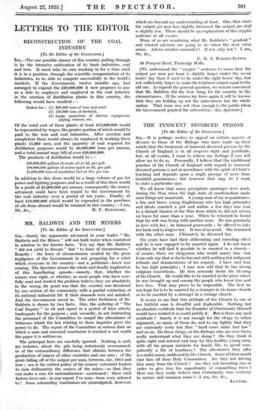MR. BALDWIN AND THE MINERS
[To the Editor of the SPECTATOR.] SIR,—Surely the arguments advanced in your leader " Mr. Baldwin and the Miners " will not hold water when examined in relation to the known facts. You say that Mr. Baldwin '" did not yield to threats " but " to force of circumstances." Exactly : the force of circumstances created by the- gross negligence of the Government in not preparing for a crisis which everyone in the country—not a politician—knew was coming. The Spectator misses the whole and deadly implication of this humiliating episode—namely, that, whether the miners were right, or whether, as most people who have care- fully read and studied the problem believe, they are absolutely in the wrong, the point was that the country was threatened by one section of the community with a partial extinction of its national industrial life if their demands were not satisfied. And the Government caved in. The utter feebleness of Mr. Baldwin is shown by two facts. One, the ordering of " The Coal inquiry " to sit and report in a period of time utterly inadequate for the purpose ; and, secondly, in not instructing the personnel of the Committee to compel the attendance of witnesses which the law relating to these inquiries gives the power to do. The report of the Committee as serious data on which a sane and reasoned conclusion is reached is not worth the paper it is written on.
The principal facts are carefully ignored. Nothing is said, for instance, about the pits being notoriously overmanned, or of the extraordinary difference that obtains between the production of miners of other countries and our own ; of the great falling off of the output per man, between, say, 1914 and now ; nor is the settled policy of the miners' extremist leaders to ruin deliberately the owners of the mines—so that they can make a case for nationalization—mentioned : these vital factors have not--in any report I've seen—been even referred to 1. Some astounding conclusions are promulgated, however. which are beyond my understanding at least. One, that while the output per man has slightly increased, the output per shift is slightly less. There should be an explanation of this cryptic sentence at all events.
Many of us are wondering what Mr. Baldwin's " prudent" and trusted advisers are going to do when the next crisis arises. Advise another surrender? If not, why not ?--I am, Sir, &c.,
E. H. S. BAnisEs-AUSTIN.
36 Prospect Road, Tunbridge Wells.
[We understood the " cryptic " sentence to mean that the output per man per hour is slightly larger under the seven hours' day than it used to be under the eight hours' day, but not sufficiently larger to make the total new output equal to the old one. As regards the general question, we remain convinced that Mr. Baldwin did the best thing for the country in the circumstances. If the miners try force again it will be known that they are holding up not the mineowners but the whole nation. That issue was not clear enough to the public when the Government granted the subvention.—En. Spectator.]


































 Previous page
Previous page